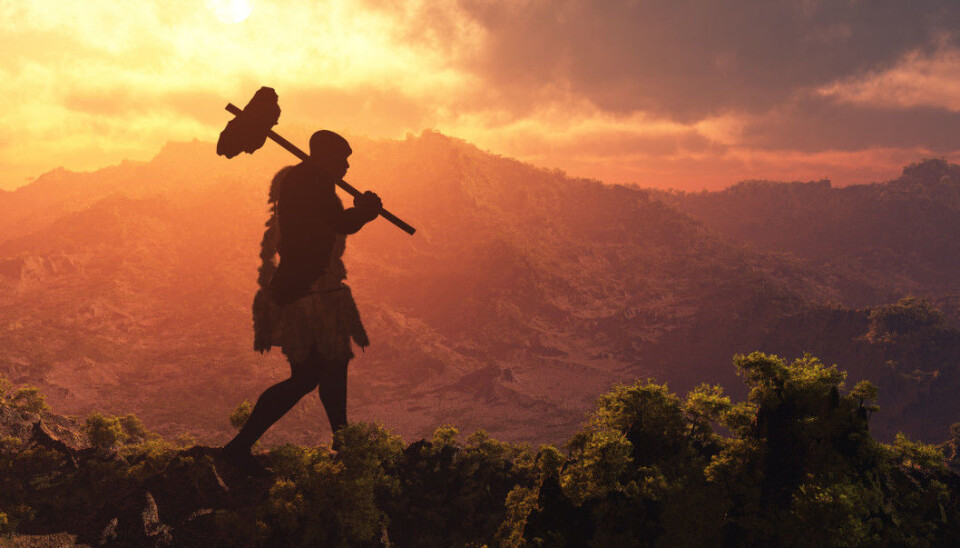
Humans have always caused plant and animal extinctions
Our warming planet is pushing some plant and animals species towards extinction. But there’s actually no such thing as untouched nature — humans have always altered their environment. That doesn’t mean we shouldn’t do our best to protect what’s here now.
Beavers build dams and modify their environment — it’s a survival strategy that has served them well over the millennia. In many ways, we humans are the same. We change our environment, and not always in ways that are good for the planet. This need to alter our surroundings is baked into our very being, say two Norwegian scientists who have just written a book about the issue.
"This is simply what makes us people," says Hans K. Stenøien, a biology professor at the Norwegian University of Science and Technology’s University Museum.
Stenøien and his colleague Reidar Andersen have written a book about our relationship with nature — starting from the time we evolved to be humans to the present day. Their book (in Norwegian) provides an overview of the field and offers their thoughts about the situation.
Their conclusion is that we have mostly taken whatever we can — not because we are deliberately out to cause harm, but for food and to survive. Our strength as a species has been our ability to find new ways to take advantage of the Earth and its natural resources. It’s this ability that has made us the dominant species on the planet.
However, when it comes to other species, we have always been bad players. The authors says that humans have been changing the climate ever since we began to walk.
"We must accept that this has a biological explanation. There is a correlation between our success as a species and the environmental crisis that is taking place today,” says Stenøien.
Climate crises since the dawn of time
Even though it may seem like climate change is a relatively new phenomenon, it actually isn’t, the authors write. Ever since we became humans, we have done things that have influenced the planet and its climate. Biologists estimate that just 20 per cent of the world can be considered true wilderness. In Norway that number is just twelve percent.
We may think that indigenous people had little effect on the planet, but Stenøien and Andersen say that’s a myth. As early as 50,000 years ago, when the first people came to Australia, their meddling with nature had catastrophic consequences.
Just 5-10,000 years after people arrived on Australia, for example, all megafauna, or animals weighing more than 45 kilograms, were gone. Twenty-three out of 24 marsupials died out, as well as a large variety of birds and reptiles.
This hunt for key species among Australia’s large animals probably contributed to climate change. Their absence changed the environment.
Blame our ancestors
Stenøien argues that one mushroom in Australia demonstrates the truth of this idea. The mushroom species, called Sporomiella, thrived in the dung of big animals.
When people came to Australia, this mushroom was everywhere. But then it disappeared. This happened more than 40,000 years ago, probably thousands of years before the continent’s climate shifted from wet to dry and fires ravaged the countryside. At the same time, the vegetation changed from rainforest to drought-tolerant species.
“If the change in climate had caused the mass extinction, one would expect the vegetation to change and become drought tolerant first, and then the makeup of the animal populations would change afterwards. But what actually happened was the opposite. The extinction took place mostly before the climate changed,” the authors wrote, referring to an article in Science magazine from 2012.
However, not everyone thinks this argument holds water. Some scientists believe that it was climate change that led to the extinction of the mushroom, not human influence.
It’s likely that a number of factors have played a role in these drastic changes, but Stenøien says there is still little doubt that our culture has contributed to environmental destruction throughout history, albeit to varying degrees in different parts of the world. On various islands in the Pacific, scientists are more certain that humans essentially eradicated everything.
Our biology is no excuse
After Australia, we continued our destructive journey through Asia and America. The introduction of agriculture also was responsible for deep changes starting 10,000 years ago. Then came the Industrial Revolution, beginning in 1700s, which really accelerated the damage.
And the destruction we’re causing now is so much more extensive than ever before that scientists are warning that we are in the process of causing the Earth’s sixth great mass extinction.
The fact that this destructive behaviour lies in our nature does not mean that we can continue to behave this way. The first people who came to Australia or New Zealand can hardly be held responsible for hunting animals and birds to extinction, because they did not fully understand the consequences of their actions.
We, however, know better, Stenøien says.
“That means we have no excuse: We must take responsibility for the changes we are making to the planet,” he says.
Reference:
Hans K. Stenøien and Reidar Andersen: Arten som forandret alt. Historien om menneskets erobring av nature. (The species that changed everything. The story of humankind’s conquest of nature.) J.M. Stenersens Forlag AS, 2018.
——————————————————-
Read the Norwegian version of this article at forskning.no.
































